七年级英语下册 Unit 2 Neighbours Study skills学案(新版)牛津版
- 格式:doc
- 大小:55.50 KB
- 文档页数:1
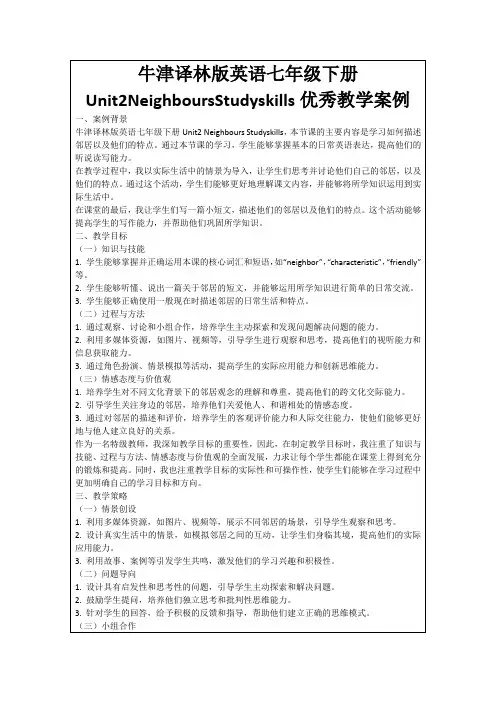
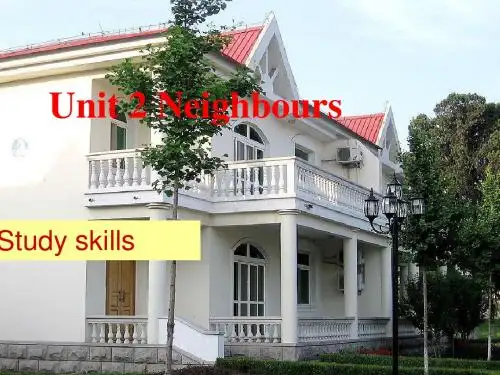
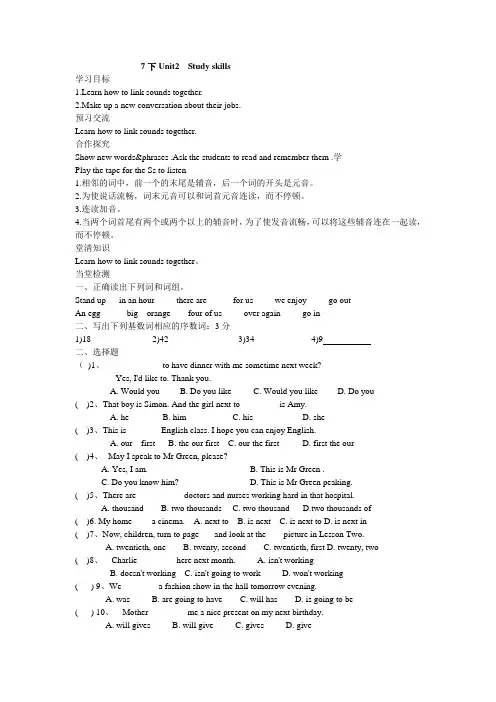
7下Unit2 Study skills学习目标1.Learn how to link sounds together.2.Make up a new conversation about their jobs.预习交流Learn how to link sounds together.合作探究Show new words&phrases .Ask the students to read and remember them .学Play the tape for the Ss to listen1.相邻的词中,前一个的末尾是辅音,后一个词的开头是元音。
2.为使说话流畅,词末元音可以和词首元音连读,而不停顿。
3.连读加音。
4.当两个词首尾有两个或两个以上的辅音时,为了使发音流畅,可以将这些辅音连在一起读,而不停顿。
堂清知识Learn how to link sounds together。
当堂检测一、正确读出下列词和词组。
Stand up in an hour there are for us we enjoy go outAn egg big orange four of us over again go in二、写出下列基数词相应的序数词:3分1)18____________ 2)42____________ 3)34_____________4)9二、选择题()1、-- __________ to have dinner with me sometime next week?--Yes, I'd like to. Thank you.A. Would youB. Do you likeC. Would you likeD. Do you( )2、That boy is Simon. And the girl next to ________ is Amy.A. heB. himC. hisD. she( )3、This is _______ English class. I hope you can enjoy English.A. our firstB. the our firstC. our the firstD. first the our( )4、--May I speak to Mr Green, please? --__________A. Yes, I am.B. This is Mr Green .C. Do you know him?D. This is Mr Green peaking.( )5、There are __________ doctors and nurses working hard in that hospital.A. thousandB. two thousandsC. two thousandD.two thousands of( )6. My home __ a cinema. A. next to B. is next C. is next to D. is next in( )7、Now, children, turn to page ___and look at the ___ picture in Lesson Two.A. twentieth, oneB. twenty, secondC. twentieth, firstD. twenty, two( )8、Charlie ________ here next month. A. isn't workingB. doesn't workingC. isn't going to workD. won't working( ) 9、We________ a fashion show in the hall tomorrow evening.A. wasB. are going to haveC. will hasD. is going to be( ) 10、Mother ________ me a nice present on my next birthday.A. will givesB. will giveC. givesD. give( ) 11、He ________ her a beautiful hat on her next birthday.A. buysB. buyC. is going to buyD. bought( ) 13、He ________ next week. A. is coming back B. came backC. will comeD. is going to coming back( ) 14、- Are his parents going to visit the Great Wall tomorrow?- No, ________ (不去).A. they willn't.B. they won't.C. they aren't.D. they don't.( ) 15、________ we ________ swimming with Tom tomorrow afternoon?A. Will; goB. Do; goC. Will; goingD. Shall; go( ) 16、We ________ the work next time.A. doB. will doC. going to doD. will doing( ) 17、The day after tomorrow they ________ a volleyball match.A. watchB. watchesC. is watchingD. will watch( )18、They ________ an English party next Sunday.A. are havingB. are going to haveC. will havingD.is going to have( )19、________ you ________ football next Sunday?A. Do; playB. Will; playC. Are; playingD. Are;play( )20、He ________ there at ten tomorrow morning.A. willB. isC. will beD. be四、阅读短文,判断正(T)与误(F)(10分)Dear Kathy,I’m in New York now. It’s a very big city. There are many tall buildings and there are many people here. I’m sitting at the desk in my bedroom. I like this bedroom. It has white walls and green curtains(窗帘). In the room there is a desk with my computer on it. There is a nice picture on the wall. In the picture, there are some beautiful flowers and a small river. It makes me think of Yangtze River in Nanjing.Please write soon.Love,Millie()36. This letter is from Millie to Kathy.( )37. Millie is in the US now.( )38. The beautiful picture is on the wall in the room.五.翻译下列句子1.Peter打算做一名画家。
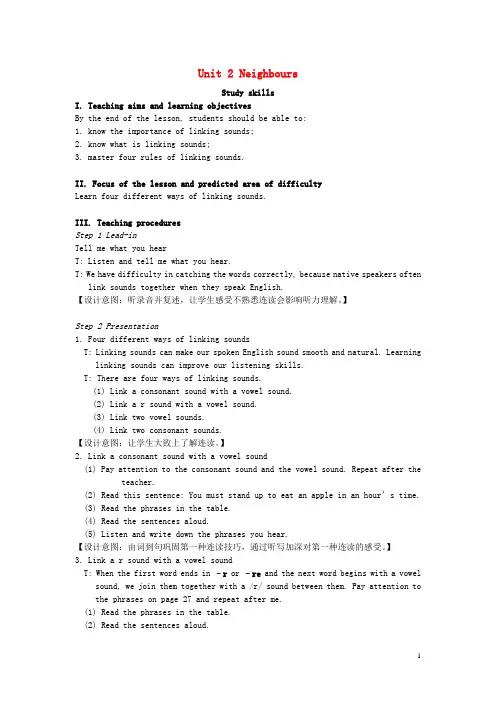
Unit 2 NeighboursStudy skillsI. Teaching aims and learning objectivesBy the end of the lesson, students should be able to:1. know the importance of linking sounds;2. know what is linking sounds;3. master four rules of linking sounds.II. Focus of the lesson and predicted area of difficultyLearn four different ways of linking sounds.III. Teaching proceduresStep 1 Lead-inTell me what you hearT: Listen and tell me what you hear.T: We have difficulty in catching the words correctly, because native speakers often link sounds together when they speak English.【设计意图:听录音并复述,让学生感受不熟悉连读会影响听力理解。
】Step 2 Presentation1. Four different ways of linking soundsT: Linking sounds can make our spoken English sound smooth and natural. Learning linking sounds can improve our listening skills.T: There are four ways of linking sounds.(1) Link a consonant sound with a vowel sound.(2) Link a r sound with a vowel sound.(3) Link two vowel sounds.(4) Link two consonant sounds.【设计意图:让学生大致上了解连读。
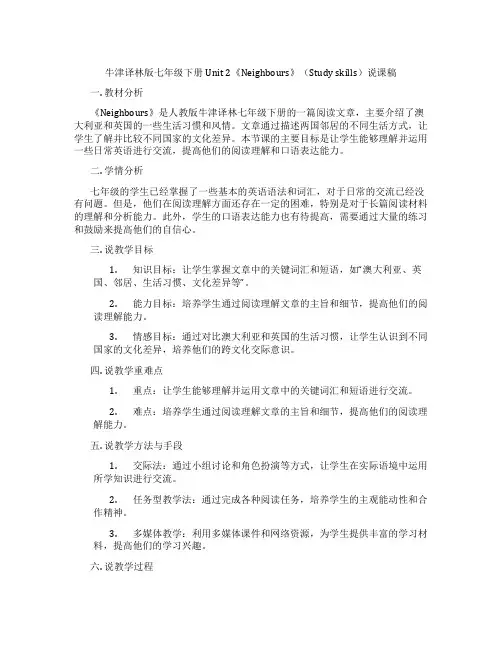
牛津译林版七年级下册Unit 2《Neighbours》(Study skills)说课稿一. 教材分析《Neighbours》是人教版牛津译林七年级下册的一篇阅读文章,主要介绍了澳大利亚和英国的一些生活习惯和风情。
文章通过描述两国邻居的不同生活方式,让学生了解并比较不同国家的文化差异。
本节课的主要目标是让学生能够理解并运用一些日常英语进行交流,提高他们的阅读理解和口语表达能力。
二. 学情分析七年级的学生已经掌握了一些基本的英语语法和词汇,对于日常的交流已经没有问题。
但是,他们在阅读理解方面还存在一定的困难,特别是对于长篇阅读材料的理解和分析能力。
此外,学生的口语表达能力也有待提高,需要通过大量的练习和鼓励来提高他们的自信心。
三. 说教学目标1.知识目标:让学生掌握文章中的关键词汇和短语,如“澳大利亚、英国、邻居、生活习惯、文化差异等”。
2.能力目标:培养学生通过阅读理解文章的主旨和细节,提高他们的阅读理解能力。
3.情感目标:通过对比澳大利亚和英国的生活习惯,让学生认识到不同国家的文化差异,培养他们的跨文化交际意识。
四. 说教学重难点1.重点:让学生能够理解并运用文章中的关键词汇和短语进行交流。
2.难点:培养学生通过阅读理解文章的主旨和细节,提高他们的阅读理解能力。
五. 说教学方法与手段1.交际法:通过小组讨论和角色扮演等方式,让学生在实际语境中运用所学知识进行交流。
2.任务型教学法:通过完成各种阅读任务,培养学生的主观能动性和合作精神。
3.多媒体教学:利用多媒体课件和网络资源,为学生提供丰富的学习材料,提高他们的学习兴趣。
六. 说教学过程1.导入:通过提问方式引导学生思考“什么是邻居”,引出本课的主题。
2.阅读理解:让学生独立阅读文章,完成相关的阅读任务,培养学生通过阅读获取信息的能力。
3.小组讨论:让学生分组讨论文章中的文化差异,培养他们的合作精神和口语表达能力。
4.角色扮演:让学生分组进行角色扮演,模拟文章中的情景,实际运用所学知识进行交流。
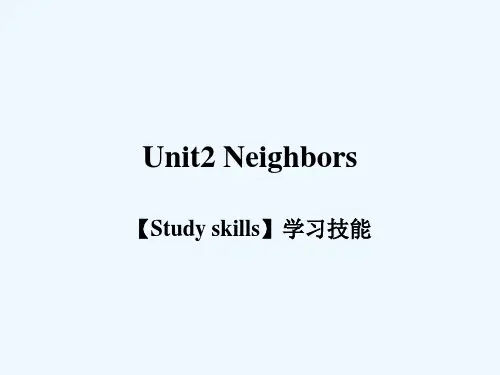


牛津译林版七年级下册Unit 2《Neighbours》(Study skills)教学设计一. 教材分析牛津译林版七年级下册Unit 2《Neighbours》主要讲述了关于邻居的话题。
通过本节课的学习,学生能够掌握与邻居相关的词汇和表达方式,学会如何用英语询问和描述邻居的信息。
教材中包含了丰富的插图、对话和练习,有助于激发学生的学习兴趣,提高他们的语言运用能力。
二. 学情分析七年级的学生已经具备了一定的英语基础,能够听懂并运用简单的英语进行交流。
但他们在口语表达和词汇积累方面仍有待提高。
此外,学生对身边的事物和人物较为熟悉,因此对邻居这一主题应能产生共鸣,有利于激发学习兴趣。
三. 教学目标1.知识目标:学生能够掌握与邻居相关的词汇和表达方式,如:neighbor, opposite, across from等。
2.能力目标:学生能够用英语询问和描述邻居的信息,提高他们的语言运用能力。
3.情感目标:学生能够学会与邻居友好相处,培养良好的邻里关系。
四. 教学重难点1.重点:掌握与邻居相关的词汇和表达方式。
2.难点:如何用英语询问和描述邻居的信息。
五. 教学方法1.情境教学法:通过设置真实的生活情境,让学生在实际语境中学习英语。
2.交际法:鼓励学生进行互动交流,提高他们的口语表达能力。
3.任务型教学法:通过完成具体任务,培养学生运用英语解决问题的能力。
六. 教学准备1.教师准备:教材、教案、多媒体教学资源。
2.学生准备:课本、笔记本、文具。
七. 教学过程1.导入(5分钟)教师通过提问方式引导学生谈论身边的人和事,如:“Do you know your neighbors? What kind o f people are they?”,激发学生的学习兴趣。
2.呈现(10分钟)教师展示教材中的插图,引导学生观察并说出邻居的名称。
然后,教师通过PPT呈现邻居的词汇和表达方式,如:neighbor, opposite, across from等,让学生跟读并模仿。
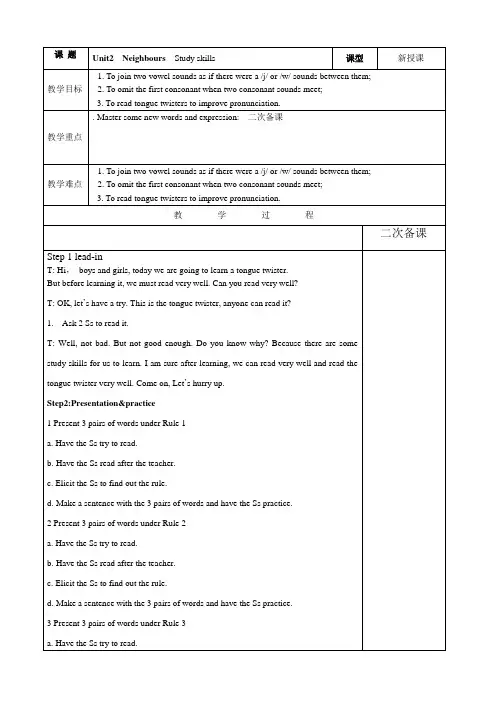
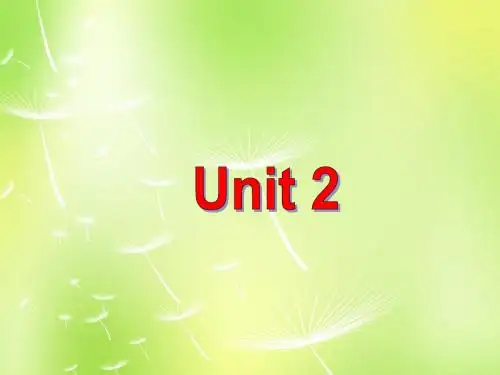
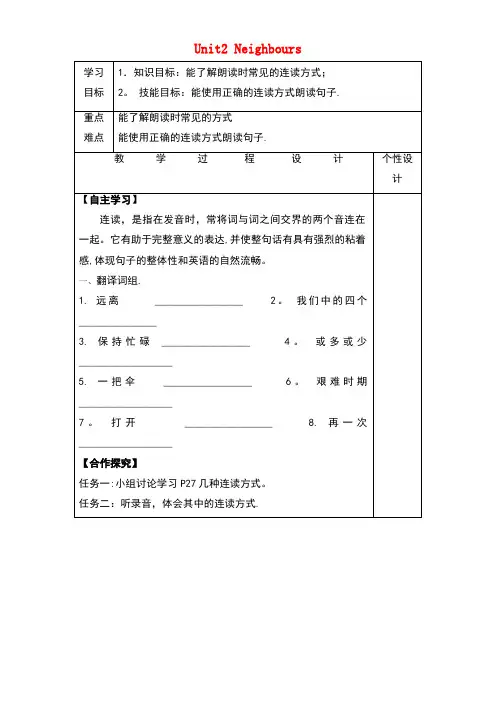
Unit2 Neighbours
尊敬的读者:
本文由我和我的同事在百忙中收集整编出来,本文档在发布之前我们对内容进行仔细校对,但是难免会有不尽如人意之处,如有疏漏之处请指正,希望本文能为您解开疑惑,引发思考。
文中部分文字受到网友的关怀和支持,在此表示感谢!在往后的日子希望与大家共同进步,成长。
This article is collected and compiled by my colleagues and I in our busy schedule. We proofread the content carefully before the release of this article, but it is inevitable that there will be some unsatisfactory points. If there are omissions, please correct them. I hope this article can solve your doubts and arouse your thinking. Part of the text by the user's care and support, thank you here! I hope to make progress and grow with you in the future.。
Unit 2 Neighbours Study skills
【学习目标】
1.能了解连读时常见的连读方式。
2.能使用正确的连读方式朗读句子。
【学习重难点】
如何在朗读中正确使用连读。
【自主学习】
【合作探究】(学生在组长的带领下试读这四组短语,讨论、发现连读现象和基本规律)
an apple stand up in an hour
there are for us here is
we enjoy go out the other
best time sit down a big cake
【课堂达标检测】
一、用本课时所学的连读方式朗读下列短语。
In a minute fall in the river tell us a story take care of it
Wait for a student for an ho ur can’t hear it open the door for us 二、用本课时所学的连读方式朗读下列句子。
He is an English boy. Let me have a look at it.
Not at all. There is a football under it.
Here are four eggs. Nice to meet you.
Would you like a cup of tea? We are going to work on a farm next Tuesday.
三、句型转换:
1. Your mother is al ways worried about your English.(改为同义句)
Yo ur mother always your English.
2. There is something old in her room.(改为一般疑问句)
old in her room?
3. He will go to Beijing tomorrow.(改为否定句)
He go to Beijing tomorrow.
4. Mary goes to school by bike every day.(就画线部分提问)
Mary to school every day?
5. Tom often h elps Miss Li do house work.(改为同义句)
Tom often Miss Li housework.
【反思】
__________________________________________________________________________
_______________________________________________________________________________ _______________________________________________________________________________ ______________________________________________________________
1。